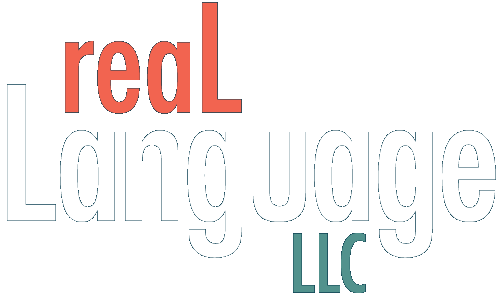Real Language uses Applied Cognitive Linguistics to solve thorny communications challenges.
Linguistics is the scientific study of language.
Linguists get asked, "So how many languages can you speak?" But while plenty of linguists are multilingual, linguistics itself is not about collecting languages; it's about studying the structures and functions of language — how it works.
Cognitive Linguistics studies the interaction between language and thought.
The way we use language reveals as well as triggers deep structures of thought. Cognitive linguistics is about understanding the interrelationship between language and our human minds.
Applied Cognitive Linguistics finds solutions to real-world language problems.
The tools of cognitive linguistics help make clear how people are making judgments, drawing conclusions, and forming opinions. Understanding these dynamics lets us create precise, persuasive, and resonant communications, from press releases to poll questions to social media posts and for issues from inequality to gun safety to education policy.
To learn more about the field of Cognitive Linguistics, see the extensive resources on the website of the International Cognitive Linguistics Association (ICLA).
For a recent example from our own Alyssa Wulf, see the article: "Framing Strategies to Avoid Mother-Blame in Communicating the Origins of Chronic Disease" (co-authored with Liana B. Winett and Lawrence Wallack, American Journal of Public Health, August 2016).
If you're interested in digging into some serious reading, we can recommend the following books:
Serious reading
- Cognitive Linguistics: An Introduction (Vyvyan Evans and Melanie Green)
- The Cognitive Linguistics Reader (Vyvyan Evans, Ben Bergen, and Jørg Zinken)
- Metaphor: A Practical Introduction (Zoltan Kovecses)
- The Way We Think: Conceptual Blending And The Mind's Hidden Complexities (Gilles Fauconnier and Mark Turner)
- Women, Fire and Dangerous Things: What Categories Reveal About the Mind (George Lakoff)
- Philosophy in the Flesh: The Embodied Mind and its Challenge to Western Thought (George Lakoff and Mark Johnson)
- Mappings in Thought and Language (Gilles Fauconnier)
Even "seriouser" reading
- Toward a Cognitive Semantics: Volumes 1 & 2 (Len Talmy)
- Concept, Image, and Symbol: The Cognitive Basis of Grammar (Ronald Langacker)
- Constructions at Work: The Nature of Generalization in Language (Adele Goldberg)
- Form and Meaning in Language: Volume 1, Papers on Semantic Roles (Charles Fillmore)
- Spaces, Worlds, and Grammar (Gilles Fauconnier and Eve Sweetser)
- Foundations of Meaning: Primary Metaphors and Primary Scenes (Joe Grady)

